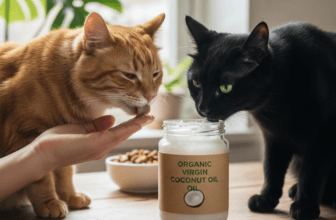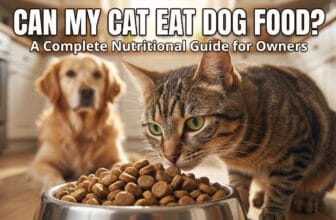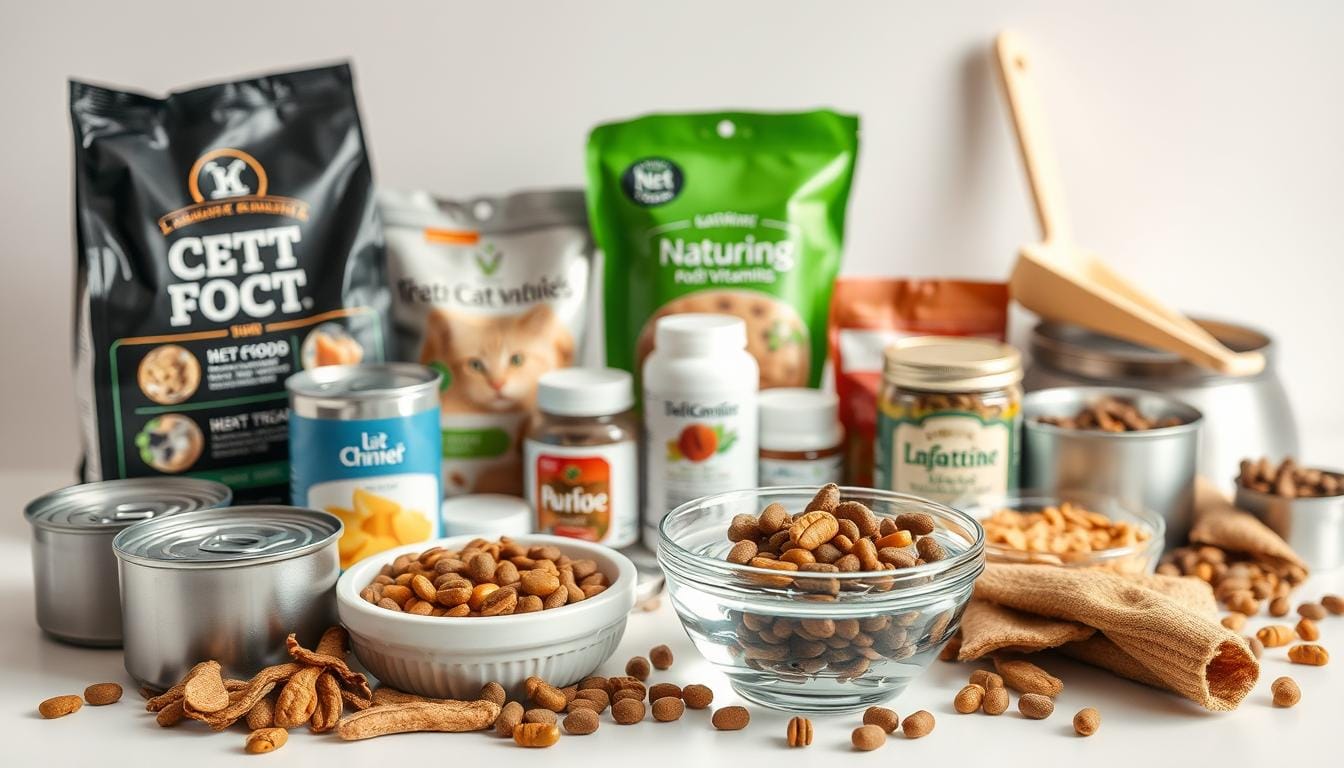
Table of Contents
Ever wondered why your cat is so picky about food? It’s all about cat nutrition, a complex field. It’s more than just filling a food bowl.
Cats are special because they need a diet rich in animal protein. This is because they are obligate carnivores. Their nutritional needs are very different from other pets, making cat nutrition very important.
Good cat nutrition is about more than just feeding them. It’s about keeping them healthy, full of energy, and living a long life. Cats have kept their dietary needs the same, even though they’ve changed a lot over time.
In this guide, we’ll dive into the world of cat nutrition. You’ll see why what you feed your cat is crucial. Get ready to learn all about your cat’s dietary needs.
Understanding Cats as Obligate Carnivores
Cats are special animals with unique dietary needs. They are obligate carnivores, meaning they need a meat-based diet to stay healthy and survive.
Why Meat is Essential for Feline Nutrition
Cats can’t live on plants like humans or some pets do. Their bodies are made to digest animal proteins well. This means they get all their nutrients from meat.
- Cats lack specific enzymes to break down plant proteins
- Their digestive tracts are shorter compared to omnivores
- They require high-quality animal protein for metabolic functions
Critical Amino Acids in Cat Nutrition
Some amino acids are key for cats’ health. Taurine is one, found only in animal tissues. Without enough taurine, cats can get sick, including heart and vision problems.
The Importance of Animal Protein
Animal protein gives cats all the amino acids they need. It helps with muscle, immune, and overall health. Since cats can’t make these nutrients from plants, meat is essential in their diet.
A cat’s diet must mimic their natural hunting diet to ensure complete nutritional needs are met.
Essential Nutrients for Feline Health
Knowing about cat nutrition is key to keeping your cat healthy. Cats need six main nutrient types to stay in top shape. Each nutrient is vital for your cat’s energy, health, and happiness.
The main nutrients for cats include:
- Proteins: The building blocks of muscle and tissue repair
- Fats: Providing energy and supporting cellular functions
- Carbohydrates: Supporting metabolic processes
- Vitamins: Regulating bodily functions
- Minerals: Supporting bone health and cellular activities
- Water: Ensuring proper hydration and metabolic processes
Protein is the most important nutrient for cats. As meat-eaters, cats need high-quality animal proteins. These proteins help keep muscles strong, support the immune system, and give energy. Make sure your cat’s food has animal proteins with all the amino acids they need.
Choosing the right food for your cat means finding the right mix of nutrients. Each type of nutrient helps your cat in its own way. So, a balanced diet is essential for their health.
Remember, every cat is unique, and nutritional needs can vary based on age, weight, and health conditions.
The Importance of Protein in Cat Nutrition
Protein is key for your cat’s health and happiness. Cats need protein because they are meat-eaters. Knowing about cat nutrition helps you choose the best food for your pet.
Cats use protein for energy and important nutrients. They process protein differently than other animals. So, they need high-quality protein to stay healthy.
Animal vs Plant Protein Sources
Animal proteins are better for cats than plant proteins. Here’s why:
- Animal proteins have complete amino acid profiles
- Cats can’t digest plant proteins well
- Meat-based proteins give cats nutrients they can’t make themselves
Recommended Protein Levels
Vets suggest certain protein levels for cats based on their age:
- Adult cats: At least 26% crude protein
- Kittens and pregnant cats: 30-40% crude protein
- Senior cats: Watch their protein intake carefully
Signs of Protein Deficiency
Look out for these signs if your cat isn’t getting enough protein:
- Muscle loss
- Dull or brittle coat
- Less energy
- Weaker immune system
Talking to your vet can help you find the right protein for your cat. This ensures they stay healthy.
Fats and Fatty Acids in Cat Diets
Fats are key in cat diets, acting as a rich energy source. They keep your cat healthy and full of energy. Knowing about fatty acids helps you choose the right food for your cat.
Experts say fatty acids are vital for many body functions. They help with:
- Skin and coat health
- Wound healing
- Controlling inflammation
- Energy use
The Association of American Feed Control Officials (AAFCO) suggests at least 9% fat in cat food. Not all fats are created equal. Omega-3 and omega-6 fatty acids are especially good for your cat’s health.
When picking cat food, choose products with good fats like:
- Fish oil
- Chicken fat
- Salmon
- Sardines
Cats can’t make some fatty acids on their own. They need to get them from food. Vets say balanced nutrition with enough fatty acids is key for your cat’s immune system and health.
Understanding Cat Nutrition Requirements
Cats have special nutritional needs that change as they grow. Knowing what your cat needs is key to keeping them healthy. Each cat’s diet depends on their age, weight, how active they are, and their health.
Feeding your cat is more than just filling their bowl. It’s about understanding many factors that affect their diet.
Daily Caloric Needs
Figuring out how many calories your cat needs involves a few important things:
- Current body weight
- Age and life stage
- Activity level
- Overall health condition
Indoor cats need fewer calories than outdoor or very active cats. A lazy cat might need about 20 calories per pound of body weight. But an active cat could need up to 35 calories per pound.
Nutrient Balance Considerations
It’s not just about how much your cat eats, but also what they eat. They need a balanced diet with the right amounts of:
- Protein
- Fats
- Carbohydrates
- Vitamins and minerals
Life Stage Requirements
Nutritional needs change a lot as cats grow. Kittens, adult cats, and older cats all have different needs. Talking to a vet can help you create a diet plan that fits your cat’s life stage.
Types of Commercial Cat Food
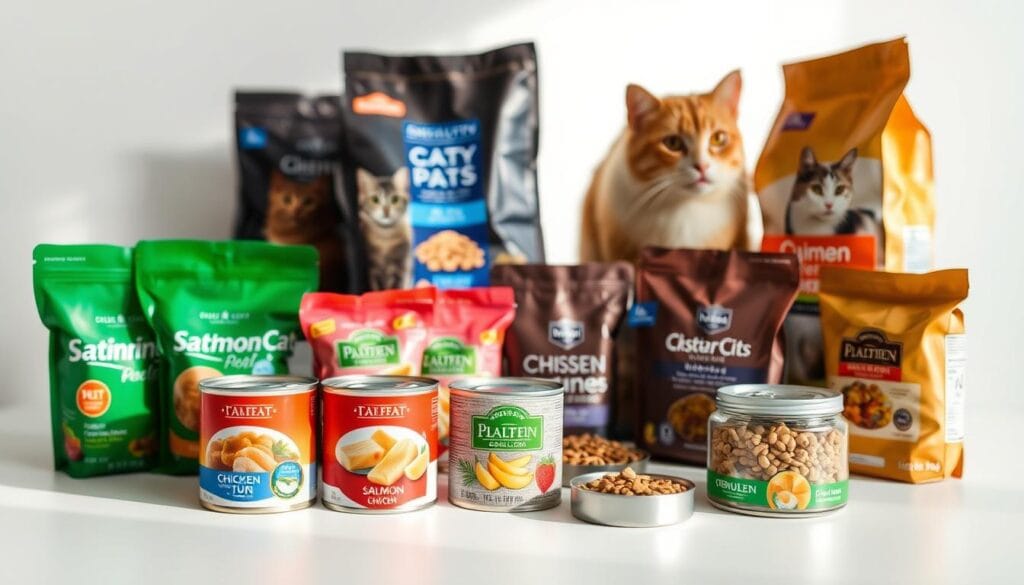
Understanding the different types of commercial cat food is key to your cat’s nutrition. There are three main types: dry, semi-moist, and canned. Each offers unique benefits for your cat’s health.
Dry cat food is the most affordable and convenient option. It lasts longer and can be left out for cats to eat whenever they want. It also helps keep their teeth clean by reducing plaque.
- Dry food contains approximately 6-10% moisture
- Typically more affordable per serving
- Convenient for free-feeding
Canned or wet foods have more moisture and protein. They are closer to a cat’s natural diet. They’re great for cats with urinary issues or those who don’t drink enough water.
| Food Type | Moisture Content | Protein Level | Cost |
|---|---|---|---|
| Dry Food | 6-10% | Medium | Low |
| Wet Food | 75-78% | High | Medium-High |
| Semi-Moist Food | 25-35% | Medium | Medium |
Semi-moist foods are a balance between dry and wet foods. They have a softer texture and more moisture than dry kibble but less than canned foods.
“Choose a commercial cat food that meets your cat’s specific nutritional needs and preferences.” – Veterinary Nutrition Experts
When picking cat food, think about your cat’s age, health, and likes. Talking to your vet can guide you to the best food for your cat.
Wet vs Dry Cat Food: Making the Right Choice
Choosing the right food for your cat is important. You need to know the benefits of wet and dry food. Think about what your cat likes and needs.
It’s hard to pick between wet and dry food for your cat. Each has its own good points. These can affect your cat’s health and happiness.
Benefits of Wet Food
- Higher moisture content supports hydration
- Often contains more protein
- More appealing taste for many cats
- Helps prevent urinary tract issues
Advantages of Dry Food
- More convenient to store and serve
- Helps maintain dental health
- More cost-effective
- Can be left out longer without spoiling
Combination Feeding Approaches
Many vets suggest a balanced approach to feeding your cat. Mixing wet and dry food can give your cat the best nutrition.
| Food Type | Pros | Cons |
|---|---|---|
| Wet Food | High moisture, rich protein | More expensive, spoils quickly |
| Dry Food | Dental health, convenient | Lower moisture, potential weight gain |
| Combination | Balanced nutrition | Requires careful portioning |
Your cat’s needs will guide the best food choice. Talk to your vet to find the best diet for your cat.
The Role of Water in Cat Nutrition
Water is key for cat health and nutrition. Cats, unlike many animals, have a special way of dealing with water. This comes from their desert-dwelling ancestors. Knowing their water needs is vital for their health.
Cats don’t drink much water, which can be a problem. Their bodies are made to get moisture from their prey. This means cats eating dry food might not get enough water.
- Cats need about 4-5 ounces of water for every 5 pounds of body weight each day
- Water comes from food and drinking
- Wet food can give up to 80% of a cat’s daily water
To help with cat nutrition and hydration, try these tips:
- Put water bowls in different places around your home
- Use wide, shallow bowls that won’t get in the way of their whiskers
- Try water fountains to make drinking more fun
- Blend wet food with dry kibble
“Hydration is not just about drinking water, but about understanding your cat’s unique nutritional needs.” – Veterinary Nutrition Experts
Proper hydration is important for many body functions, like kidney health, digestion, and keeping the body cool. Watching how much water your cat drinks can help avoid health problems. It also helps keep them happy and healthy.
Vitamins and Minerals Essential for Cats
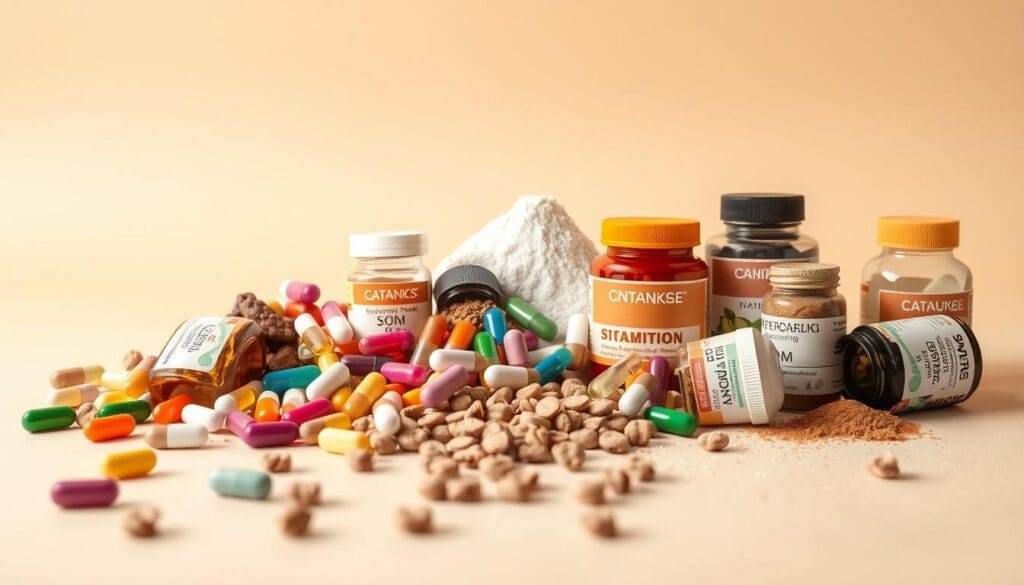
Cat nutrition is all about finding the right mix of vitamins and minerals. Knowing what your cat needs can help keep them healthy. It also supports their overall well-being.
Cats need certain vitamins for their body to work right. The most important vitamins for them include:
- Vitamin A: Critical for vision, immune function, and skin health
- Vitamin D: Supports bone health and calcium absorption
- Vitamin E: Provides antioxidant protection
- B-complex vitamins: Essential for energy metabolism and nervous system function
Minerals are also key for cat health. Your cat needs specific minerals for their body to function well. Some of the most important minerals include:
- Calcium: Supports bone and teeth strength
- Phosphorus: Works with calcium for bone health
- Taurine: An amino acid crucial for heart and eye health
- Magnesium: Important for muscle and nerve function
Commercial cat foods usually have the right mix of vitamins and minerals. But, each cat’s needs can change based on age, health, and lifestyle. Always talk to your vet to make sure your cat gets the right nutrition.
Proper vitamin and mineral intake is not about quantity, but about the right balance for your cat’s specific needs.
While supplements can help sometimes, they should not replace a good diet. Too much of a supplement can harm your cat’s health. So, it’s important to be careful and get advice from a vet.
Reading and Understanding Cat Food Labels
Understanding cat food labels can be tough. But knowing what’s in the packaging helps you choose the right food for your cat.
Cat food labels share important info on what’s in the food and its quality. The Association of American Feed Control Officials (AAFCO) offers guidelines. These help pet owners read labels better.
Ingredient Lists Decoded
Ingredients are listed by weight, with the most important first. When checking cat food, look for:
- Named meat sources as the first ingredients
- Minimal fillers and by-products
- Recognizable whole food ingredients
Nutritional Guarantees Explained
The guaranteed analysis shows key nutritional info. It usually includes:
| Nutrient | Minimum/Maximum Level |
|---|---|
| Crude Protein | Minimum 30-40% |
| Crude Fat | Minimum 10-15% |
| Moisture | Maximum 10-12% |
| Crude Fiber | Maximum 3-5% |
Knowing how to read labels lets you pick the best food for your cat. Always look for AAFCO statements. They show the food is complete and balanced.
Common Nutritional Deficiencies in Cats
Cat nutrition is key to your pet’s health. Knowing about nutritional gaps can stop serious health issues.
Cats need specific foods to stay healthy. Lack of certain nutrients can harm their health and cause long-term problems.
- Taurine Deficiency: A crucial amino acid for cats that cannot be naturally produced in their bodies
- Vitamin A Deficiency: Can cause vision and skin problems
- Thiamine Deficiency: Impacts neurological function and metabolism
It’s important to spot signs of nutritional gaps in cats. Symptoms include:
- Lethargy and weakness
- Poor coat condition
- Digestive issues
- Reduced immune function
Vets suggest a balanced diet for cats to avoid these gaps. Regular vet visits and quality cat food ensure they get needed nutrients.
“Prevention is always better than cure when it comes to cat nutrition deficiencies.” – Veterinary Nutrition Experts
Knowing about these gaps helps keep your cat healthy and well-nourished.
Special Dietary Considerations for Different Life Stages
Cat nutrition varies with each life stage. Your cat’s needs change a lot, so it’s important to pay close attention and tailor their diet.
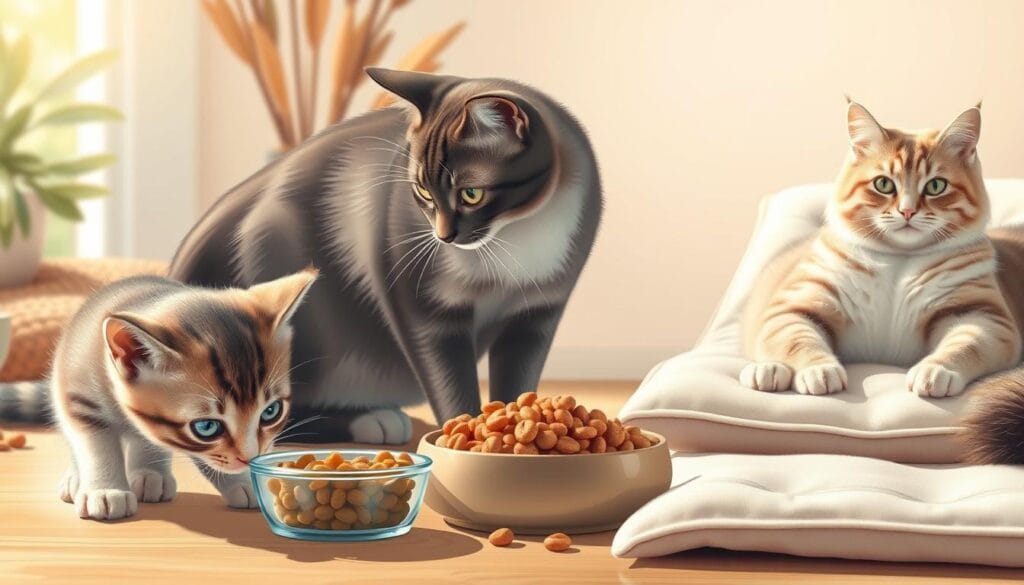
Knowing what your cat needs at each stage is key. It helps keep them healthy and full of life. Good nutrition supports their growth, keeps them in shape, and helps them age well.
Kitten Nutrition Needs
Kittens need special food to grow fast and strong. Their diet should be full of:
- High-protein content
- Increased calorie density
- Essential amino acids
- Balanced mineral content
Young cats need three to four times more calories than adult cats. This helps them grow quickly and stay full of energy.
Adult Cat Requirements
Adult cats need a balanced diet to stay healthy. Their food should have:
- Moderate protein levels
- Controlled calorie intake
- Consistent nutrient balance
Senior Cat Dietary Adjustments
As cats get older, their metabolism slows down. They need different food. Senior cats often require:
- Lower-calorie diets
- Enhanced digestibility
- Supplements supporting joint health
- Increased moisture content
Talking to a vet can help you find the right food for your cat. They can guide you based on your cat’s age and health.
Feeding Schedules and Portion Control
Knowing the right time to feed your cat is key to keeping them healthy and preventing obesity. Unlike other pets, cats prefer to eat small meals all day long.
When planning your cat’s diet, remember these important points for a good feeding schedule:
- Age of your cat
- Weight and body condition
- Activity level
- Overall health status
Vets usually suggest two to three measured meals per day. This helps keep your cat’s metabolism steady and stops them from eating too much. Free feeding can cause your cat to gain too much weight, which is bad for their joints and organs.
It’s also important to control how much food your cat eats. Here’s how to figure out the right amount:
- Ask your vet for advice
- Look at the food packaging for serving size tips
- Change the amount based on your cat’s weight and how active they are
- Keep an eye on your cat’s body shape
An adult cat needs about 20-30 calories per pound of body weight every day. Kittens and active cats might need more, while older or less active cats need fewer calories.
Pro tip: Use a measuring cup to ensure consistent and accurate portion sizes during each feeding schedule.
By sticking to a set feeding schedule and controlling portions, you’ll meet your cat’s nutritional needs and keep them at a healthy weight.
Avoiding Common Cat Nutrition Mistakes
Cat nutrition can be tricky. Many pet owners make mistakes that harm their cat’s health. It’s important to know these errors to keep your cat healthy.
Some common mistakes include:
- Feeding dog food instead of cat-specific meals
- Overlooking portion control and causing overfeeding
- Neglecting proper hydration
- Offering dangerous human foods
Dog food is not good for cats. Cats need special nutrients that dog food doesn’t have. They need amino acids like taurine, which dog food lacks.
Feeding too much is another big mistake. Many owners give too much food, leading to obesity. Consult your veterinarian to find the right amount of food for your cat.
Some human foods are bad for cats. These include:
- Chocolate
- Onions and garlic
- Grapes and raisins
- Caffeine
- Alcohol
Water is also key for cats. They don’t drink enough, so wet food and extra water are important. This helps prevent dehydration.
By avoiding these mistakes, you can keep your cat healthy. This ensures they get the right nutrition.
Conclusion
Understanding cat nutrition is key for pet owners. Your cat’s diet is vital for their health and happiness. This guide has shown that cats need a special diet because of their unique needs.
For a balanced diet, focus on animal proteins, fatty acids, and vitamins. Knowing this helps you choose the right food for your cat. Whether it’s commercial or homemade, making informed choices is important.
Vets are essential for cat nutrition advice. They consider your cat’s age, health, and needs. Regular vet visits and talking about nutrition ensure your cat stays healthy.
This guide has prepared you to care for your cat’s nutrition. Remember, every cat is different and their needs change. Stay alert, seek professional advice, and choose high-quality food for your cat’s best care.
FAQ
What makes cats different from other pets in terms of nutrition?
Cats need a diet rich in meat because they are obligate carnivores. They can’t digest plant proteins well. They also need animal-based nutrients like taurine to stay healthy.
How much protein does my cat need in their diet?
Adult cats need about 30-40% protein in their food. This protein should come from animal sources. It helps with muscle, immune, and metabolic health.
Is wet or dry food better for my cat?
Both wet and dry foods have their benefits. Wet food has more moisture and protein. Dry food is convenient and can help with dental health. Many vets suggest a mix of both for the best nutrition.
How much water should my cat drink daily?
Cats need about 3.5 to 4.5 ounces of water for every 5 pounds of body weight daily. Since they get moisture from prey, wet food is a good way to ensure they stay hydrated.
Can I feed my cat a vegetarian diet?
No, cats can’t live on a vegetarian diet. They need animal-based nutrients like taurine, which plants don’t have. A vegetarian diet can cause serious health issues.
How do a cat’s nutritional needs change with age?
Cats’ nutritional needs change a lot with age. Kittens need more protein and calories for growth. Adult cats need balanced nutrition for maintenance. Senior cats may need more digestible proteins and fewer calories.
What human foods are toxic to cats?
Many human foods are toxic to cats, including chocolate, onions, garlic, grapes, raisins, and alcohol. These can cause serious health problems, from digestive issues to organ failure. Always avoid giving them to your cat.
How can I prevent my cat from becoming overweight?
To prevent cat obesity, measure portions, avoid free-feeding, and choose high-quality food. Provide regular exercise and consult with your vet about the right calorie intake for your cat’s age, weight, and activity level.
Do cats need vitamin supplements?
Most commercial cat foods are nutritionally complete. Supplements are usually not needed and can be harmful if not prescribed by a vet. Always check with a professional before adding supplements to your cat’s diet.
How do I read a cat food label correctly?
When reading cat food labels, look at the ingredient list (ingredients are listed by weight). Check for AAFCO statements of nutritional adequacy. Examine the guaranteed analysis for protein and fat percentages. Make sure the food matches your cat’s life stage needs.



